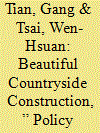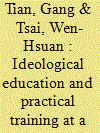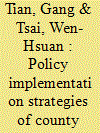|
|
|
Sort Order |
|
|
|
Items / Page
|
|
|
|
|
|
|
| Srl | Item |
| 1 |
ID:
192131


|
|
|
|
|
| Summary/Abstract |
This article seeks to demonstrate that there is a certain degree of political participation in contemporary China. We argue that the qunzhong, or ‘masses’, in China can be divided into three categories: members of autonomous grassroots organizations, local elites (xin xiangxian), and victims of rights violations, and we illustrate our discussion of the impact of these three groups on policy through the example of the ‘Beautiful Countryside Construction’ policy. Our analysis focuses on how the masses express their opinions to inspection teams dispatched by county governments. Finally, we argue that China’s grassroots qunzhong do have a role in providing feedback on policy, but whether their suggestions are heeded by the higher-level authorities still depends on wider political considerations.
|
|
|
|
|
|
|
|
|
|
|
|
|
|
|
|
| 2 |
ID:
177960


|
|
|
|
|
| Summary/Abstract |
Under Xi Jinping, the Chinese Communist Party is concentrating efforts on the cultivation of outstanding local cadres in order to improve local governance. For this purpose, it is strengthening the functions of local Party schools that offer students both political and administrative education to create a cohort of cadres who are both “red and expert.” We discuss how this is done in terms of curriculum planning, types of classes, and the student pool, using the example of County Z Party School. We find that since the national Eighteenth Party Congress, the Central Committee has reinforced its control over local Party schools to ensure that their curriculum and the methods they use to train cadres are consistent with national Party directives, as part of Beijing’s efforts to strengthen the Party’s grassroots governance.
|
|
|
|
|
|
|
|
|
|
|
|
|
|
|
|
| 3 |
ID:
184086


|
|
|
|
|
| Summary/Abstract |
Using the concept of ‘hedging’, we explore how local cadres in China deviate from central policies in order to serve local interests and, while doing so, avoid being called to account by their superiors. Political signals enable cadres to decide when to invest more resources into the implementation of certain policies. In this way, they optimize their performance and avoid the political risks involved in failing to carry out their designated tasks. This article uses county Y as an example in a discussion of county-level implementation of policies related to economic growth and air pollution control. We find that local cadres weaken the functions of the superior ‘special inspection team’ (专项督察组, hereafter inspection team), treating them as political instruments used by the central and local authorities to ensure a greater level of responsiveness at the grass roots. Information concerning the imminent arrival of an inspection team in their locality acts as a signal for cadres to allocate more resources to the enforcement of air pollution control measures, thus maximizing their performance in this area. Through this research, we have endeavoured to provide a deeper understanding of the operating logic of Chinese local governments and the behaviour of county cadres.
|
|
|
|
|
|
|
|
|
|
|
|
|
|
|
|
|
|
|
|
|